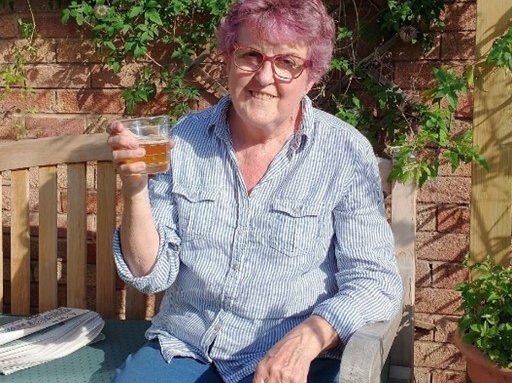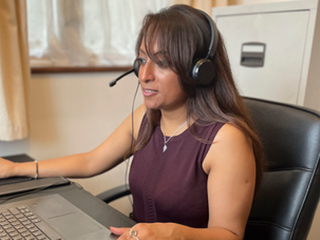Coping with the risk of coronavirus
People with blood cancer are at higher risk from covid, but there are lots of things you can do to reduce your risk.
Page updated 18 December 2023
Key things to know
- People with blood cancer have a higher risk than other people of getting seriously ill with covid.
- There are effective ways to reduce your risk, including getting all your covid vaccine booster doses, and getting treatment quickly if you do get covid.
- The government is no longer advising people to shield, but has issued guidance for people with weakened immune systems to reduce their risk.
Reducing your risk
Everyone’s situation is different, and it’s not always easy or possible to remove every risk. But there are lots of things you can do to protect yourself in your daily life:
- Get all of your covid vaccine doses - with each booster, more people with blood cancer develop covid antibodies.
- Know how to access antibody and antiviral treatments if you do get covid. They have been found to be effective in people with impaired immune systems who get covid.
- Keep a stock of lateral flow tests so you can test yourself quickly if you get symptoms of covid.
- Try to avoid contact with people who have symptoms of covid or other respiratory infections.
- Remember that ventilation is key to reducing risk - when you mix with other people, try to have good ventilation by meeting outside or having a window open.
- Consider asking visitors to your home to take a lateral flow test before visiting. You could also ask them to wear a mask, or wear a mask yourself. Masks classed as FFP3 offer the best protection, as they protect against smaller particles.
- Consider wearing a face covering in crowded public spaces, or avoid crowded spaces if you can.
- Clean your hands frequently with soap and water or hand sanitiser.
Blood cancer and covid stories
Most people are trying to find the right balance between protecting themselves from covid and still living their life and looking after their mental well-being. We asked six people with blood cancer how they're coping, and what's helping them make the choices that are right for them.

Should I still be shielding?
The UK government is no longer advising anyone to shield. Instead, they have issued guidance to people whose immune system means they are at higher risk. This gives advice on ways to keep yourself safe, without having to shield.
Research shows that shielding can have a negative impact on your mental health. Many people with blood cancer have stopped shielding, but we know some people are still choosing to shield. We have more information below about making decisions that are right for you.
Making decisions that are right for you
Whatever your situation, you can take some control by thinking about the different risks in your life, and which ones you might be able to change.
Even with risks that you can’t completely remove, there are probably ways you can make them slightly less risky. There are tips below about things to try if you are worried about the risk from school or work.
You might want to start by writing out a list of activities you do. For example: going to the shops; looking after children; going to work; meeting friends; doing a hobby with other people; going out to eat.
You can then think about:
- Which risks you’ll remove completely (for example, you might get shopping delivered so you can avoid the shops)
- Which risks you’ll reduce (for example, still spending time with family, but wearing a mask in crowded situations)
- Which risks you can’t you remove (for example, going to work).
Talking to someone can help you work things out - talk to other people with blood cancer in our online forum, or talk to us.
Balancing risks and benefits
There will probably always be some level of risk in what you do. Most people need a balance between trying not to catch covid, but still being able to live their life. You might find there are times when the benefit of doing something (such as the benefit to your mental health of spending time with friends and family) outweighs any risk.
School worries
If you have children at school, you might be very worried about catching covid this way.
Talk to your child’s school about your situation. They might be able to find ways to further reduce the risk of your child catching covid at school. Ask your medical team for advice. They may give you information to share with the school, to help you have a conversation.
You could talk to other parents with blood cancer on our online community forum.
It’s a worrying time for parents and children. Our Support Service can tell you about support and resources for your children if they are finding things hard.
Work worries
Government guidance for people whose immune system means they are at higher risk says you should work from home if you can, and if it feels right for you.
If you’ve been diagnosed with any blood cancer, you have rights. You are protected by disability law across the UK, even if you’re in remission.
If you can’t work from home, employers still have a duty to protect the health and safety of all their staff. Talk to your medical team and get a note to say it’s unsafe for you to attend the workplace, or that changes need to be made to reduce risk.
As someone with blood cancer, you are protected by the law, which says that your employer must consider reasonable adjustments to help you stay safe at work. This can include making changes to reduce your risk of infection at work.
If you're still being pressured to go to work, despite your medical team's advice that it is unsafe, get advice from Acas (Helpline: 0300 123 1100).
We have more information about:
- Legal protection from discrimination
- Adjusting your role or hours to reduce risk
- Financial support
See our information on work and money.
Face masks in hospitals
Following a change in NHS guidance, it’s no longer compulsory to wear face masks in all areas of hospitals and other healthcare settings. Local policies on mask wearing vary, so some hospitals may require mask wearing while others do not. If you are immunosuppressed, this may mean you may feel more worried about attending appointments.
It’s understandable if you are concerned, but it's essential to keep going to your appointments. There are steps you can take to lower your risk.
Remember that hospitals and clinics will still carry out local risk assessments in settings where patients are at high risk from covid. So departments like haematology or oncology may still require everyone to wear face masks.
If you’re not sure what the policy is or you have any concerns about your level of risk, call the hospital, clinic or surgery:
- Explain that you are immunosuppressed and at high risk from covid infection.
- Ask what the policy is about mask-wearing in the department or clinic where you have an appointment.
- If you don’t feel reassured, say that you will be wearing a face mask and request that staff and visitors do the same.
Remember that surgical masks and FFP masks offer better protection than cloth face coverings. Masks classed as FFP3 offer the best protection to the person wearing them. Surgical and FFP masks should be used once and thrown away.

Talk to us about covid worries
We know that covid can be really worrying. Even though we can’t take all the risks and worry away, just talking to someone who understands can help.
What if someone in my household gets covid?
As someone who's at higher risk of serious illness, there are precautions you can take to protect yourself if someone you live with gets covid. These things may depend on the layout of your home and your relationship to the person who has covid.
Everyone’s situation is different, and it’s not usually possible to remove every risk. But there are lots of things you can do in combination to protect yourself:
- Wear an FFP3 face mask – a mask can protect you from inhaling particles in the air like dust, pollutants, bacteria and viruses. Masks classed as FFP3 offer the best protection, as they protect against the smaller particles. An FFP3 mask can't totally prevent you from getting covid, but it can reduce the risk.
- Ventilate your home – It helps to keep shared spaces well-ventilated by opening windows and letting air move in and out.
- Sleep separately – If you can, sleep in separate beds, or ideally, separate rooms.
- Stay 2 metres apart if you can – Keeping your distance can help, so try to stay in separate rooms as much as possible.
- Keep your hands clean – Wash your hands regularly for at least 20 seconds or use hand sanitiser, and avoid touching your face.
- Clean frequently – Clean and disinfect objects and surfaces which get touched a lot, such as door handles.
- Use separate bathrooms – Or if you share a bathroom, clean it after each use.
- Keep personal items separate – Use separate towels and keep personal items like toothbrushes away from each other.
- Don't share kitchen items – Use separate cutlery, crockery, dishcloths and tea towels to stop germs spreading.
Because coronavirus can be spread by airborne (aerosol) transmission as well as droplet transmission, you might still catch covid even if you try your best to stay apart. So it's also important that you:
- Get free lateral flow tests - use them so that if you do catch it, you'll find out quickly and can access any treatment you need.
- Get all of your covid vaccine doses - with each booster, more people with blood cancer develop covid antibodies.
- Know how to access antibody and antiviral treatments if you do get covid.
More support for you
We are here to help. We know this has been a very difficult time for many in our community, and it continues to be. Get more support coping with uncertainty around covid from our Support Services Team on 0808 2080 888 or [email protected]. Or, talk to other people with blood cancer in our online forum.
Funding disclosure
The following pharmaceutical companies have funded this information but have had no input into the content or direction of the project: AbbVie, AstraZeneca, Celgene, Gilead, Incyte, Kyowa Kirin, Novartis, Pfizer, Sanofi, Takeda.
Sign up to our newsletter
Get the latest news from Blood Cancer UK directly to your inbox.
We will keep you updated about our work and the ways you can help, including campaigns and events. We promise to respect your privacy and we will never sell or swap your details.
